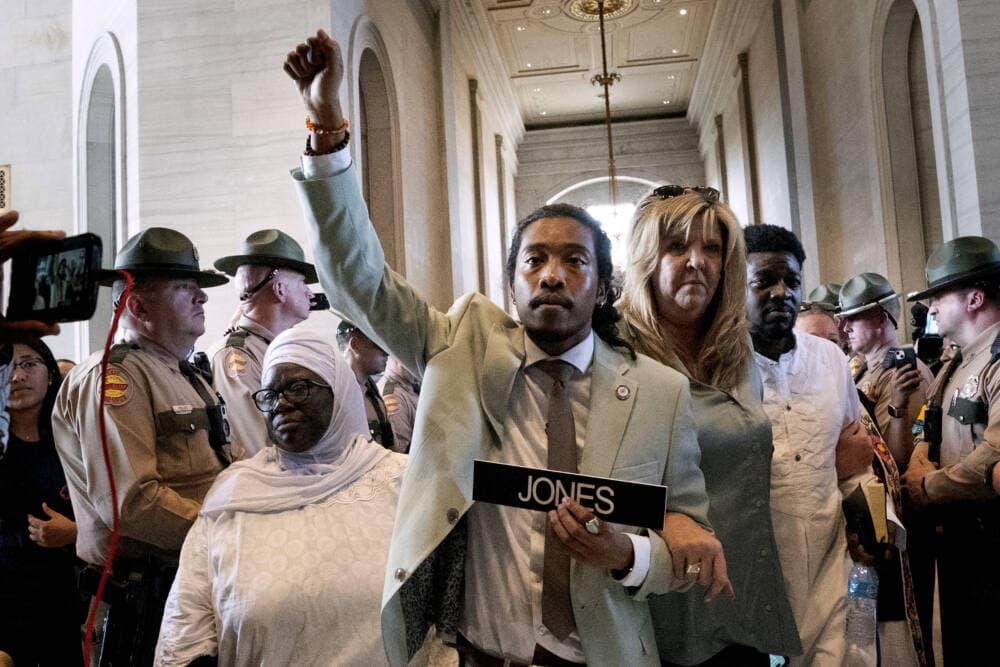Advertisement
Rep. Justin Jones on his expulsion and reinstatement from Tennessee House over gun protests

Hear this interview on our podcast, Here & Now Anytime.
Tennesee Republicans expelled two young, Black Democratic lawmakers for protesting on the House floor. They were reinstated days later.
Here & Now's Deepa Fernandes speaks to one of them, Rep. Justin Jones about how he's moved forward and what legislation he's pushing for.
Interview transcript
Deepa Fernandes: The Tennessee House expelled Democratic Representative Justin Jones after he protested for gun restrictions on the House floor after a deadly mass shooting at a school in Nashville. Days later, he was sworn back in, and now he's fighting against a bill that would allow teachers, principals and other school personnel to carry concealed handguns on school grounds. Representative Justin Jones joins us now. Welcome to Here & Now.
Rep. Justin Jones: Thank you so much for having me.
Fernandes: Representative Jones, start by reminding us why you and your fellow lawmakers were protesting on the House floor that day that led to your expulsion. What was happening on the floor? I mean, it was just days after the deadly school shooting. What were you calling for in your protest? Because I feel like we've lost that part in the swirl of media coverage around the expulsion.
Jones: Definitely. We were protesting, calling for common sense gun laws: Laws like red flag laws, universal background checks and a ban on militarized weapons like AR-15. And that whole week, this happened just days after the Covenant shooting. And that whole week, as we tried to talk about the issue of proliferation of guns in our communities, the Speaker, you know, would not even allow us to speak on the House floor. He cut off microphones. They shut us down in committee. We were not able to even lift up the issue. And so that is why we went to the well of the House in an act of nonviolent action to try and raise the issue that we must address this crisis of gun violence in our community after, you know, repeatedly being shut down and silenced. Because what they were doing was not just silencing us, they were silencing the voices of our district.
Fernandes: And the Republican supermajority solution to that mass shooting is a proposal that would allow teachers and others to be armed. You vehemently disagree. Tell us why.
Jones: I vehemently disagree with that, because it's as if we were having an issue of fires in schools and saying, let's put more matches, let's put more gasoline. This proposal to allow more guns in schools went before the Education Committee, which I once was a member of before being removed by the speaker, and on that committee, we had dozens of teachers show up, multiple of them, to testify against this bill. No teacher came before us saying we want this legislation, no parent came before us saying that we want this legislation. In fact, they feel like this will create a more unsafe environment for our students and youth. They delayed voting on it last night in the House and they're trying to push it. But I hope that when it does come up for a vote that my Republican colleagues, the more moderate ones who I've talked to, who are against it as well, will vote against it.
Fernandes: Do you feel like, Representative Jones, you talked about, you know, your mic being cut off, being shut down in committee. You've been elected. I think we all imagine that our elected representatives are listened to. Since you've been reinstated, have those kinds of actions by the speaker or other Republicans on committees continued? Are you being listened to more now?
Jones: I think because the world is watching and there's many more cameras in the Capitol, they've tried to be on a little bit better behavior, but it is a part of their culture on Capitol Hill. When I entered the legislature, I'm 27, I'm the youngest black lawmaker was told that, you know, I should not speak, you know, And I told them that I'm not here as an intern. I'm here to represent my district. You know, that's why cutting off our microphone is so anti-democratic. It's authoritarian, and it's not aligned with how our body should work as a deliberative body.
Fernandes: Yeah. You know, you're not new to protesting. And before you were elected to the state House, you were a movement leader. In fact, you helped organize the 62-day occupation of the plaza outside the Tennessee State House called the People's Plaza. You've also been on the receiving end of brutality from the police. You've been arrested for peacefully protesting. Now, as a lawmaker, you're expelled again for protesting. As you yourself said, you're young, Black, you're 27. How do you understand all of this that has been happening?
Jones: I think, I mean I know that it's all connected, that we are in a state in which the political power does not like voices of dissent, and they do whatever they can to silence those voices, whether it's to jail you or it's to expel you, because under the state constitution, they can't jail lawmakers. And so they did the next thing that was to try and expel us from the body. But even before being expelled, I don't know if people realized, the Speaker had kicked me off all my committees, he shut off my ID badge so I couldn't get into the building and shut off my parking access, so I couldn't even park parking in the garage of the Capitol with the other legislators. And so they had already done all these tactics to try and, you know, ostracize us and to silence us. But it didn't work. It is so shameful that even as a colleague, they still act with the same disdain and same repressive tactics to shut us down even though we were democratically sent there. To them, this is not a democracy, it is an authoritarian system in which any voice that is disruptive not just in terms of protest, but just disruptive in terms of challenging the status quo, must be silenced and crushed.
Fernandes: For those who don't know, you've written a really compelling book on the 62-day nonviolent occupation of the plaza outside the statehouse. One of the things I found fascinating, Representative Jones, is the older Black women in the community who you referred to because you constantly turn to them for guidance. I imagine you're turning to some of them again now. I wonder if you can maybe share one piece of wisdom that you've received in the last week that's really helped you through things.
Jones: Definitely. Well, one of them I want to lift up, my dear mentor and an honorary grandmother, Diane Nash, who was a leader of the student movement here in Nashville during the 1960s: one of our civil rights leaders who just got the Presidential Medal of Freedom last year. I was with her at the White House. And, you know, one thing that she's always reminded me is to stay focused. And I think, you know, to stay focused on what causes us to act in the first place. But number two, she said, do not underestimate your opponents. You know, like, let us be cognizant that we are fighting a system that has taken this extreme step of expulsion because it feels threatened.
Fernandes: I mean, your book is so compelling, and I just appreciated what a deep part of the movement you've been. And maybe in Tennessee, people really know that. But I feel like we don't nationally appreciate that.
Jones: I mean, that book was a labor of love. It was it was therapy. And to work there, I mean, that's the thing is like people say, how is it to go to work in this building after being expelled? I went to this building after being beaten here, threatened, banned, explusion is small compared to those, you know, to having the police drag you in the night, the same troopers I walk by every day to get into that building.
Fernandes: And I wonder, too, everyone is looking at you. The whole country is looking at you and your fellow representative, Justin Pearson. And I'm wondering how that feels because you're carrying your district's hopes and dreams, but you're also having to look Republicans in the eye every day who voted to kick you out.
Jones: Yeah, I think there is pressure there. But also I think the humbling and empowering part of it was that this support from across the nation, across the world really reminded us that this is so much bigger than us as individuals, and that's where the power lies, that we stand with this movement across the world saying we're not going to allow democracy to be killed in the comfort of silence, but we're going to fight for this vision of multiracial democracy and we're going to resist these attacks to try and roll back the clock of history.
Fernandes: I want to just ask you quickly, because one of the things that you have to do now, day in, day out, is try and work with those Republicans to get some of your agenda passed. How do you do that? Is there a way to work with them?
Jones: Yeah. The members, the Republican member who sits in front of me on the House floor, you know, he start talking to me and he said, you know, will you forgive me? Because I think a lot of them have had their eyes open, that they just were blindly following their speaker. I'll give you an example. The day I was reinstated, I was on the elevator with Representative Bud Hulsey who filed the resolution to expel me. He's chairman of Criminal Justice. And we were on the elevator. I greeted him and I said, Representative Hulsey, did you learn anything from this experience? And he admitted that, he said, you know, I didn't want to expel you in the first place. But the Speaker told me to file this resolution cause I'm chair of Criminal Justice Committee and he wanted the chairman to file these resolutions. But I didn't...I thought this was a step too far. There's a lot of dissension in their party. Some are calling on the House Speaker to resign. The climate is very complicated on Capitol Hill. I'm willing to work with our Republican colleagues, like our governor, who's a Republican, who's calling for red flag laws because of public pressure. We have an NRA endorsed governor saying we need a red flag law, something that's unheard of in a Republican state.
Fernandes: I want to ask you in closing, Representative Jones, do you think the Republican actions might have actually helped your cause and helped the cause by drawing more attention to it and maybe actually winning some change on gun reform?
Jones: I definitely think it's changed the political calculus here. It's the reason why my colleagues are trying, we have three more weeks of session and they're trying to condense it all into this week to get out of this week to rush out of Nashville because of this public pressure, because they know that that the people are going to force them to take action on common sense gun laws. And it's also awakened a generation where I believe that we've come 2024, Gen Z and younger millennials are going to really be a transformational force in Tennessee. And that's what scares my colleagues. You know, I think that they've lost a generation, that their extreme actions have awakened this wildfire that they cannot put out. And so, you know, it gives me hope that we're going to take action for common sense gun laws. You know, it gave me hope that they were scared to pass that arming teachers bill because there are thousands of people in the galleries in the rotunda watching them saying, we do not want this bill that they had to try and play a game to try and delay it so that they're trying to do it when people are not there. But people are going to continue to show up. And so we've changed the political reality of Tennessee, a deep red state that has really now been awakened to an energy that I believe is going to be like a third Reconstruction here and it's going to give make real and resurrect this promise of a multiracial democracy.
Fernandes: Tennessee Representative Justin Jones, one of the two Black Democrats, expelled and then reinstated to the Tennessee House. Thank you so much, Representative Jones.
Jones: Thank you.
This segment aired on April 18, 2023.

